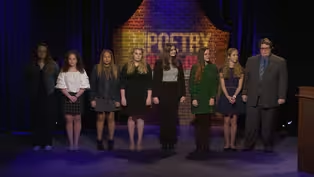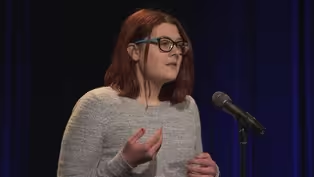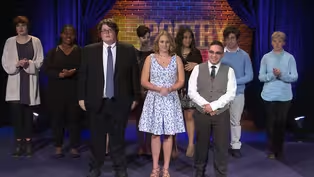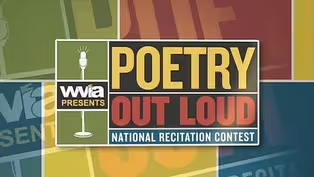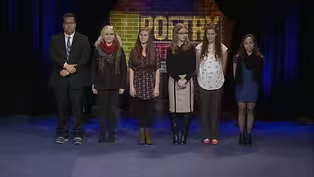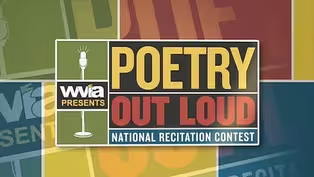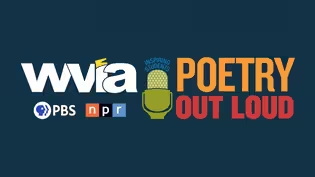WVIA Special Presentations
2021 Poetry Out Loud Regional Competition
Season 2021 Episode 5 | 46m 43sVideo has Closed Captions
WVIA is proud to host the NEPA regional competition
Poetry Out Loud is a national program from which high school students learn about great poetry through memorization and recitation. WVIA is proud to host the NEPA regional competition from which our winner will advance to the state championship in Harrisburg.
Problems playing video? | Closed Captioning Feedback
Problems playing video? | Closed Captioning Feedback
WVIA Special Presentations is a local public television program presented by WVIA
WVIA Special Presentations
2021 Poetry Out Loud Regional Competition
Season 2021 Episode 5 | 46m 43sVideo has Closed Captions
Poetry Out Loud is a national program from which high school students learn about great poetry through memorization and recitation. WVIA is proud to host the NEPA regional competition from which our winner will advance to the state championship in Harrisburg.
Problems playing video? | Closed Captioning Feedback
How to Watch WVIA Special Presentations
WVIA Special Presentations is available to stream on pbs.org and the free PBS App, available on iPhone, Apple TV, Android TV, Android smartphones, Amazon Fire TV, Amazon Fire Tablet, Roku, Samsung Smart TV, and Vizio.
Providing Support for PBS.org
Learn Moreabout PBS online sponsorshipMore from This Collection
The Poetry Out Loud Regional Competition is supported by the Pennsylvania Council on the Arts and the Arts in Education. Support for this regional competition funded by the Overlook Estate Foundation, Northeastern Educational Intermediate Unit (NEIU #19), and WVIA.
2022 Poetry Out Loud Regional Competition
Video has Closed Captions
WVIA is proud to host the NEPA regional competition (45m 29s)
2020 Poetry Out Loud Regional Competition
Video has Closed Captions
2020 Poetry Out Loud Regional Competition (45m)
2019 Poetry Out Loud Regional Competition
Video has Closed Captions
2019 Poetry Out Loud Regional Competition (47m)
2018 Poetry Out Loud Regional Competition
Video has Closed Captions
2018 Poetry Out Loud Regional Competition (47m)
2017 Poetry Out Loud Regional Competition
Video has Closed Captions
April is National Poetry Month and WVIA is celebrating all month long. (43m)
2016 Poetry Out Loud Regional Competition
Video has Closed Captions
2016 Poetry Out Loud Regional Competition (34m 29s)
2015 Poetry Out Loud Regional Competition
Video has Closed Captions
2015 Poetry Out Loud Regional Competition (40m 5s)
2014 Poetry Out Loud Regional Competition
Video has Closed Captions
2014 Poetry Out Loud Regional Competition (48m 54s)
Providing Support for PBS.org
Learn Moreabout PBS online sponsorship(upbeat music) - Good evening, and welcome to the Poetry Out Loud regional competition.
I'm your host, Kirsten Smith.
Poetry Out Loud is a national program from which high school students learn about great poetry through memorization and recitation.
One of the students here tonight will advance to the state competition in Harrisburg, and perhaps to the national finals in Washington, DC in April, where the state winners will compete for a grand prize scholarship.
As you can see, we have an empty theater here at WVIA.
Usually it is filled with family members, friends, and teachers here to support their students.
But with the COVID restrictions, we had to modify our competition.
We called in each student to privately and safely recite their three poems.
At this time, we filmed them using limited team members to comply with social distancing guidelines.
The rules were the same: one reading of each poem, prompts when needed.
When the filming was completed, we sent the videos to the judges for their assessments.
Thank you to all participating teachers throughout Northeastern Pennsylvania for developing creative ways to hold your in-school competitions and generate enthusiasm in your students.
Our nine regional contestants are all winners representing their own high schools.
They'll compete in three rounds, and we'll award certificates to all participants and prizes to the top finishers.
But before we get started, we have some people to thank for making this great event possible, starting with Pennsylvania Council on the Arts regional director, Dr. Catherine Richmond-Cullen, Arts in Education NEPA assistant director, Liz Faist, the Northeastern Intermediate Unit, and the Overlook Estate Foundation.
In this competition, students will be judged on physical presence and posture, voice projection and articulation, appropriate gestures that enhance the recitation, level of difficulty, and evidence of understanding.
Now it is my pleasure to introduce our talented students who will be competing tonight, beginning with, from MMI Preparatory, Jillian McGeehin.
- "Thoughtless Cruelty," by Charles Lamb.
"There, Robert, you have killed that fly, and should you thousand ages try the life you've taken to supply, you could not do it.
You surely must have been devoid of thought and sense, to have destroyed a thing which no way you annoyed.
You'll one day rue it.
'Twas but a fly, perhaps you'll say, that's born in April, dies in May, that does but just learn to display his wings one minute, and in the next is vanished quite.
A bird devours it in his flight, or come a cold blast in the night, there's no breath in it.
The bird but seeks his proper food.
And Providence, whose power endued that fly with life, when it thinks good, may justly take it.
But you have no excuses for it, a life by Nature made so short, less reason is that you for sport should shorter make it.
A fly a little thing you rate.
But Robert, do not estimate a creature's pain by small or great.
The greatest being can have but fibers, nerves, and flesh, and these the smallest ones possess, although their frame and structure less, escape our seeing."
- From Holy Cross, Jillian Brennan.
- "Sunshower," by Natalie Shapero.
"Some people say the devil is beating his wife.
Some people say the devil is pawing his wife.
Some people say the devil is doubling down on an overall attitude of entitlement toward the body of his wife.
Some people say that in spite of the devil's public, longstanding, and meticulously logged disdain for the health and wholeness of his wife, the devil spends all day, every day, insisting grandly and gleefully on his general pro-woman ethos, that the devil truly considers himself to be an unswayed crusader, effortlessly magnetic, scrupulous, gracious, and in spite of the devil's several advanced degrees, a luminous autodidact.
Some people say calm down, this is commonplace.
Some people say calm down, this is very rare.
Some people say the sun is washing her face.
Some people say in Hell, they're having a fair."
- From Wallenpaupack Area High School, Lucas Ryan.
- "Stopping by Woods on a Snowy Evening," by Robert Frost.
"Whose woods these are, I think I know.
His house is in the village, though.
He will not see me stopping here to watch his forest fill up with snow.
My little horse must think it queer to stop without a farmhouse near, between a forest and frozen lake, the darkest evening of the year.
He gives his harness bells a shake to ask if there is some mistake.
The only other sound's the sweep of easy wind and downy flake.
The woods are lovely, dark and deep, but I have promises to keep and miles to go before I sleep, and miles to go before I sleep."
- From the Hazleton Area Arts and Humanities School, Yamile Nader Almonte.
- "Midnight Office," by Cynthia Cruz.
"The child is not dead.
She's sleeping.
Gone from this world which is broken.
The angel of Michael outside the garden, his circle of fire maddening around the tree.
He put the word back into her, a heavy kind of music.
Then she was free, as we all are.
All night I stood in the icy wind, praying for the storm to destroy me, but the wind blew through me like I was a hologram.
If you say I am a mystic, then fine.
I'm a mystic.
The trees are not trees, anyway."
- From Abington Heights High School, Maria Adonizio.
- "Ah!
Why, Because the Dazzling Sun," by Emily Bronte.
"Ah!
why, because the dazzling sun restored my earth to joy, have you departed, every one, and left a desert sky?
All through the night, your glorious eyes were gazing down in mine, and with a full heart's thankful sighs, I blessed that watch divine.
I was at peace, and drank your beams as they were life to me, and reveled in my changeful dreams like petrel on the sea.
Thought followed thought, star followed star, through boundless regions on, while one sweet influence near and far thrilled through and proved us one.
Why did the morning rise to break so great, so pure a spell, and scorch with fire the tranquil cheek where your cool radiance fell?
Blood-red he rose, and arrow-straight, his fierce beam struck my brow.
The soul of nature sprang elate, but mine sank, sad and low.
My lids closed down, yet through their veil, I saw him blazing still, and bathe in gold the misty dale, and flash upon the hill.
I turned me to the pillow then to call back night and see your worlds of solemn light again throb with my heart and me.
It would not do.
The pillow glowed, and glowed both roof and floor, and birds sang loudly in the wood, and fresh wind shook the door.
The curtains waved, the wakened flies were murmuring around the room, imprisoned there till I should rise and give them leave to roam.
Oh, stars and dreams and gentle night, oh night and stars, return and hide me from the hostile light that does not warm but burn, that drains the blood of suffering men, drinks tears instead of dew.
Let me sleep through his blinding rain, and only wake with you."
- From Riverside High School, Megan Kielar.
- "The Wish, by a Young Lady," by Laetitia Pilkington.
"I ask not wit, nor beauty do I crave, nor wealth, nor pompous titles wish to have.
But since, 'tis doomed through all degrees of life, whether a daughter, sister, or a wife, that females should the stronger males obey, and yield implicit to the lordly sway, since this I say is every woman's fate, give me a mind to suit my slavish state."
- From Tunkhannock Area High School, Emma Race.
- "Toy Boat," by Ocean Vuong, for Tamir Rice.
"Yellow plastic, black sea.
Eye-shaped shard on a darkened map.
No shores now to arrive or depart, no wind but this waiting which moves you as if the seconds could be entered and never left.
Toy boat, oarless, each wave a green lamp outlasted.
Toy boat, toy leaf dropped from a toy tree, waiting, waiting, as if the sparrows thinning above you are not already pierced by their own names."
- From Valley View High School, Ian Kovatch.
- "Fate," by Carolyn Wells.
"Two shall be born the whole world wide apart, and speak in different tongues, and pay their debts in different kinds of coin, and give no heed each to the other's being, and know not that each might suit the other to a T, if they were but correctly introduced.
And these, unconsciously, shall bend their steps, escaping Spaniards and defying war, unerringly toward the same trysting place, albeit they know it not.
Until at last they enter the same door, and suddenly they meet.
And ere they've seen each other's face, they fall into each other's arms upon the Broadway cable car.
And this is fate."
- And our homeschool student, Alec Cherundolo.
- "Here," by Joshua Mohegan.
(sighs) "Nothing has changed.
They have a welcome sign, a hill with cows and a white house on top, a mall and a grocery store where people shop, a diner where some people go to dine.
It is the same, no matter where you go, and downtown you will find no big surprises.
Each fall the dew point point falls until it rises.
White snow, green buds, green lawn, red leaves, white snow.
This is all right.
This is their hope.
And yet, though what they see is never what they get, it does feel somehow changed from what it was.
Is it the people, houses, fields, the weather?
Is it the streets?
Is it these things together?
(sighs) Nothing here ever changes, till it does."
- And now, on to round two.
From MMI Preparatory, Jillian McGeehin.
- "To My Dear and Loving Husband," by Anne Bradstreet.
"If ever two were one, then surely we.
If ever man were loved by wife, then thee.
If ever wife was happy in a man, compare with me, ye women, if you can.
I prize thy love more than whole mines of gold, or all the riches that the East doth hold.
My love is such that rivers cannot quench, nor ought but love from thee give recompense.
Thy love is such I can no way repay.
The heavens reward thee manifold, I pray.
Then while we live, in love let's so persevere that when we live no more, we may live ever."
- From Holy Cross High School, Jillian Brennan.
- "The Dream Play," by Derek Mahon.
"What night rule now about this haunted grove?
The spirits have dispersed, the woods faded to gray from midnight blue, leaving a powdery residue.
Night music fainter, frivolous gods withdrawing, cries of yin and yang, discords of the bionic young, cobweb and insects, hares and deer, wild strawberries and eglantine, dawn silence of the biosphere.
Amid the branches, a torn wing.
What is this enchanted place?
Not the strict groves of academe, but an old thicket of lost time, too cool for school, recovered space where the brain yields to nose and ear, folk remedy and herbal cure, old narratives of heart and hand, and a dazed donkey, starry-eyed, with pearls and honeysuckle crowned, beside her naked nibs is laid.
Wild viruses, Elysian fields, our own planet lit by the fire of molten substance, constant flux, hot ice and acrobatic sex.
The electric moth touch of desire and a new vision, a new regime, where the white blaze of physics yields to yellow moonlight, dance and dream induced by what mind-altering drug or rough-cast magic realism.
Till morning, bright with ant and bug, shines in a mist of glistening gism, shifting identities, mutant forms, angels evolved from snails and worms."
- From Wallenpaupack Area High School, Lucas Ryan.
- This is "Kubla Khan," by Samuel Taylor Coleridge.
"In Xanadu did Kubla Khan a stately pleasure dome decree where Alph the sacred river ran through caverns measureless to man down to a sunless sea.
So twice five miles of fertile ground with walls and towers were girdled round.
And there were forests bright with sinuous rills, where blossomed many an incense-bearing tree.
And here the forests, ancient as the hills, enfolding sunny spots of greenery.
But oh, that deep romantic chasm, which slanted down the green hill, athwart a cedarn cover.
A savage place, as holy and enchanted as e'er, beneath a waning moon was haunted by a woman wailing for her demon lover.
And from this chasm, with ceaseless turmoil seething, as if this earth in fast thick pants were breathing, a mighty fountain momently was forced, amid whose swift, half-intermitted burst, huge fragments vaulted like rebounding hail, or chaffy grain beneath the thresher's flail.
And mid these dancing rocks, at once in ever, it flung up momently the sacred river.
Five miles meandering with a mazy motion, through wood and dale the sacred river ran, then reached the caverns measureless to man and sank in tumult to a lifeless ocean.
And mid this tumult, Kubla heard from far ancestral voices prophesying war.
The shadow of the dome of pleasure floated midway on the waves, where was heard the mingled measure from the fountain and the caves.
It was a miracle of rare device, a sunny dome with caves of ice.
A damsel with a dulcimer in a vision once I saw.
It was an Abyssian maid, and on her dulcimer she played, singing of Mount Abora.
Could I revive within me her symphony and song, to such a deep delight 'twould win me that with music loud and long, I will build this dome in air, this sacred dome, these caves of ice.
And all who heard should see them there, and all should cry, beware, beware!
His flashing eyes, his floating hair!
Weave a circle round him thrice, and close your eyes in holy dread, for he on honeydew hath fed, and drank the milk of paradise."
- From the Hazleton Area Arts and Humanities, Yamile Nader Almonte.
- "No, I wasn't meant to love and be loved," by Mirza Asadullah Khan Ghalib, translated by Vijay Seshadri.
"No, I wasn't meant to love and be loved.
If I'd lived longer, I would have waited longer.
Knowing you are faithless keeps me alive and hungry.
Knowing you faithful would kill me with joy.
Delicate are you, and your vows are delicate too, so easily do they break.
You are a laconic marksman.
You'll leave me not dead, but perpetually dying.
I want my friends to heal me, succor me.
Instead, I get analysis.
Conflagrations that would make stones drip blood are campfires compared to my anguish.
Two-headed, inescapable anguish.
Love's anguish, or the anguish of time.
Another dark, severing, incommunicable night.
Death would be fine if I only died once.
I would have liked a solitary death, not this lavish funeral, this grave anyone can visit.
You are mystical, Ghalib, and also you speak beautifully.
Are you a saint?
Or just drunk as usual?"
- From Abington Heights High School, Maria Adonizio.
- "It Couldn't Be Done," by Edgar Albert Guest.
"Somebody said that it couldn't be done.
But he with a chuckle replied, 'Then maybe it couldn't.'
But he would be one who wouldn't say so till he tried.
So he buckled right in with the trace of a grin on his face.
If he worried, he hid it.
He started to sing as he tackled the thing that couldn't be done, and he did it.
Somebody scoffed, 'Oh, you'll never do that.
At least no one ever has done it.'
But he took off his coat, and he took off his hat, and the first thing we knew he'd begun it.
With a lift of his chin and a bit of a grin, without any doubting or quiddit.
He started to sing as he tackled the thing that couldn't be done, and he did it.
There are thousands to tell you it cannot be done.
There are thousands to prophesy failure.
There are thousands to point out to you, one by one, the dangers that wait to assail you.
But just buckle in with a bit of a grin.
Just take off your coat and go to it.
Just start in to sing as you tackle the thing that cannot be done, and you'll do it."
- From Riverside High School, Megan Kielar.
- "The Arrow and the Song," by Henry Wadsworth Longfellow.
"I shot an arrow into the air.
It fell to earth, I knew not where.
For so swiftly it flew, the sight could not follow it in its flight.
I breathed a song into the air.
It fell to earth, I knew not where.
For who has sight so keen and strong that it can follow the flight of song?
Long, long afterward in an oak, I found the arrow still unbroke.
And the song, from beginning to end, I found again in the heart of a friend."
- From Tunkhannock Area High School, Emma Race.
- "Backdrop Addresses Cowboy," by Margaret Atwood.
"Starspangled cowboy, sauntering out of the almost silly West, on your face a porcelain grin, tugging a papier-mache cactus on wheels behind you with a string, you are innocent as a bathtub full of bullets.
Your righteous eyes, your laconic trigger fingers, people the streets with villains.
As you move, the air in front of you blossoms with targets, and you leave behind you a heroic trail of desolation.
Beer bottles slaughtered by the side of the road, bird skulls bleaching in the sunset.
I ought to be watching from behind a cliff or a cardboard storefront when the shooting starts, hands clasped in admiration.
But I am elsewhere.
Then what about me?
What about the I confronting you on that border you are always trying to cross?
I am the horizon you ride towards, the thing you can never lasso.
I am also what surrounds you, my brain scattered with your tin cans, bones, empty shells, the litter of your invasions.
I am the space you desecrate as you pass through."
- From Valley View High School, Ian Kovatch.
- "Weighing In," by Rhina P Espaillat.
"What the scale tells you is how much the earth has missed you, body, how it wants you back again after you leave it to go forth into the light.
Do you remember how earth hardly noticed you then?
Others would rock you in their arms, warm in the flow that fed you, coaxed you upright.
Then earth began to claim you with spots and fevers, began to lick at you with a bruised knee, a bloody shin, and finally to stoke you, body, drumming intimate, coded messages through music you danced to unawares, there in your dreaming and your poems and your obedient blood.
Body, how useful you became, how lucky, heavy with news and breakage, rich and sad, sometimes imagining that greedy zero you became, you must have been, that empty sack of possibilities, never to come tomorrow.
But look at you now, body.
Look down.
Look how much the earth weighs you, needs what you know."
- And wrapping up round two, our homeschool student, Alec Cherundolo.
- "The Charge of the Light Brigade," by Alfred Lord Tennyson.
- "Half a league, half a league, half a league onward, all in the valley of death rode the 600.
'Forward, the Light Brigade!
Charge for the guns!'
he said.
Into the valley of death rode the 600.
'Forward, the Light Brigade!'
Was there a man dismayed?
Not though the soldier knew someone had blundered.
Theirs not to make reply, theirs not to reason why, theirs but to do and die.
Into the valley of death rode the 600.
Cannon to the right of them, cannon to the left of them, cannon in front of them volley and thundered, stormed at with shot and shell.
Boldly they rode and well, into the jaws, into the jaws of death, into the mouth of hell, rode the 600.
Flash all their sabres bare, flash as they turned in air, sabring the gunners there, charging an army, while all the world wondered.
Plunge into the battery smoke, right through the line they broke.
Cossack and Russian reeled from the sabre stroke, shatter and sundered.
Then they rode back, but not, not the 600.
Cannon to the right of them, cannon to the left of them, cannon behind them, volley and thundered, storm at with shot and shell, while horse and hero fell.
They that had fought so well came through the jaws of death, back from the mouth of hell, all that was left of them, left of 600.
When can their glory fade?
Oh, the wild charge they made!
All the world wondered.
Honor the charge they made!
Honor the Light Brigade, noble 600!"
- And now, round three.
From MMI Preparatory, Jillian McGeehin.
- "The End of Science Fiction," by Lisel Mueller.
"This is not fantasy.
This is our life.
We are the characters who have invaded the moon, who can not stop their computers.
We are the gods who can unmake the world in seven days.
Both hands are stopped at noon.
We are beginning to live forever in lightweight, aluminum bodies with numbers stamped on our backs.
We dial our words like Muzak.
We hear each other through water.
The genre is dead.
Invent something new.
Invent a man and a woman naked in a garden, invent a child that will save the world, a man who carries his father out of a burning city.
Invent a spool of thread that leads a hero to safety.
Invent an island on which he abandons the woman who saved his life, with no loss of sleep over his betrayal.
Invent us as we were before our bodies glittered and we stopped bleeding.
Invent a shepherd that kills a giant, a girl who grows into a tree, a woman who refuses to turn her back on the past and is changed to salt.
A boy who steals his brother's birthright and becomes the head of a nation.
Invent real tears, hard love, slow-spoken, ancient words, difficult as a child's first steps across a room."
- From Holy Cross High School, Jillian Brennan.
- "A Boat Beneath a Sunny Sky," by Lewis Carroll.
"A boat beneath a sunny sky, lingering onward dreamily in an evening of July.
Children three that nestle near, eager eye and willing ear, pleased a simple tale to hear.
Long has paled that sunny sky.
Echoes fade and memories die.
Autumn frosts have slain July.
Still she haunts me, phantomwise, Alice moving under skies, never seen by waking eyes.
Children yet the tale to hear, eager eye and willing ear, lovingly shall nestle near.
In a Wonderland they lie, dreaming as the days go by, dreaming as the summers die.
Ever drifting down the stream, lingering in the golden gleam, life, what is it but a dream?"
- From Wallenpaupack Area High School, Lucas Ryan.
- "The Listeners," by Walter de La Mare.
"'Is anybody there?'
said the Traveller, knocking on the moonlit door, as his horse in the silence clamped the grasses of the forest's ferny floor.
And a bird flew up out of the turret above the Traveller's head.
As he smote upon the door again a second time, 'Is there anybody there?'
he said.
But no one descended to the Traveller, no head from the leaf-fringed sill leaned over and looked into his gray eyes, where he stood perplexed and still.
But only a host of phantom listeners that dwelt in the lone home then stood listening in the quiet of the moonlight for the voice of the world of men, stood thronging the faint moon beams of the dark stair that goes down the empty hall, hearkening in an air stirred and shaken by the lone Traveller's call.
And he felt in his heart their strangeness, their stillness answering his cry, while his horse moved, cropping the dark turf under the starry and leafy sky.
As he suddenly smote upon the door, even louder, lifting his head, 'Tell them I came and no one answered, that I kept my word,' he said.
Never the least stir made the listeners, though his words fell echoing through the shadowiness of the still house of the one man left awake.
They heard his foot upon the stirrup and the sound of iron on stone.
And how the silence surged slowly backward, as the plunging hooves were gone."
- From Hazleton Area Arts and Humanities, Yamile Nader Almonte.
- "When You Are Old," by William Butler Yeats.
"When you are old and gray and full of sleep, and nodding by the fire, take down this book and slowly read, and dream of the soft look your eyes had once, and of their shadows deep.
How many loved your moments of glad grace, and loved your beauty with love false or true, but one man loved the pilgrim soul in you, and loved the sorrows of your changing face.
And bending down beside the glowing bars, murmur, a little sadly, how love fled and paced upon the mountains overhead and hid his face amid a crowd of stars."
- From Abington Heights High School, Maria Adonizio.
- "The Poem You've Been Waiting For," by Tarfia Faizullah.
"I saw then the white-eyed man, leaning in to see if I was ready yet to go where he has been waiting to take me.
I saw then the gnawing sounds my faith has been making, and I saw too that the shape it sings in is the color of cast-iron mountains.
I drove so long to find that I forgot I was looking for them, for the you I once knew and the you that was born waiting for me to find you.
I've been twisting and turning across these lifetimes where forgetting me is what you do so you don't have to look at yourself.
I saw that I would drown in a creek carved out of a field.
Our incarnations forged the first path through to those mountains.
I invited you to stroll with me there again for the first time, to pause and sprawl in the grass while I read to you the poem you hadn't known you'd been waiting to hear.
I read until you finally slept, and all your jagged syntaxes softened into rest.
You're always driving so far from me towards the me without you I worry is eternity.
I lay there awake, keeping watch while you snored.
I waited, as I always seem to, for you to wake up and come back to me."
- From Riverside High School, Megan Kielar.
- "Be Music, Night," by Kenneth Patchen.
"Be music, night, that her sleep may go where angels have their pale tall choirs.
Be a hand, sea, that her dreams may watch thy guidesman touching the green flesh of the world.
Be a voice, sky, that her beauties may be counted and the stars will tilt their quiet faces into the mirror of her loveliness.
Be a road, earth, that her walking may take thee where the towns of heaven lift their breathing spires.
Oh, be a world and a throne, God, that her living may find its weather and the souls of ancient bells in a child's book shall lead her into thy wondrous house."
- From Tunkhannock Area High School, Emma Race.
- "Safe in their Alabaster Chambers," by Emily Dickinson.
"Safe in their alabaster chambers, untouched by morning and untouched by noon, sleep the meek members of the Resurrection, rafter of satin and roof of stone.
Grand go the years in the crescents above them, worlds scoop their arcs and firmaments row, diadems drop and doges surrender, soundless as dots on a disk of snow."
- From Valley View High School, Ian Kovatch.
- "In Love, His Grammar Grew," by Stephen Dunn.
"In love, his grammar grew rich with intensifiers, and adverbs fell madly from the sky like pheasants for the peasantry.
And he, as sated as they were, lolled under shade trees until roused by moonlight and the beautiful fraternal twins, and and but.
Oh, that was when he knew he couldn't resist a conjunction of any kind.
One said accumulate, and the other was a doubter who loved the wind and the mind that cleans up after it.
For love, he wanted to break all the rules, light a candle behind a sentence named Sheila, always running on and wishing to be stopped by the hard button of a period.
Sometimes in desperation, he'd look toward a mannequin or a window dresser with a penchant for parsing.
But mostly he wanted you, Sheila, and the adjectives that could precede and change you, bluesy, fly-by-night, queen of all that is and might be."
- And wrapping up tonight's competition, our homeschool student, Alec Cherundolo.
- "Fire and Ice," by Robert Frost.
"Some say the world will end in fire, some say in ice.
From what I've tasted of desire, I hold with those who favor fire.
But if I had to perish twice, I think I know enough of hate to say that for destruction, ice is also great and would suffice."
- And that concludes our readings.
We would like to thank the teachers, students, and families for supporting these talented students.
If your school didn't participate this year but you would like to be part of Poetry Out Loud next year, please get in touch with WVIA, and we'll make sure you receive the information.
The judges have tallied the scores, and now for the winners.
In third place, Jillian McGeehin from MMI Preparatory.
The Poetry Out Loud runner up, Maria Adonizio, Abington Heights.
And our winner for the Poetry Out Loud regional competition, and advancing to States in Harrisburg, is Yamile Nader Almonte.
Congratulations to our winners, and to all of the contestants for such a wonderful job.
A special thanks to the lead teachers and our judges, who certainly helped make this competition possible.
Of course it is our pleasure to thank the Poetry Foundation and the National Endowment for the Arts, as well as the Pennsylvania Council on the Arts regional director, Dr. Catherine Richmond-Cullen, the NEIU, and the Overlook Estate Foundation, who make this broadcast possible.
WVIA is proud to showcase the talented students of our region, and to provide quality arts and cultural programming and educational services, all thanks to your support.
I'm Kirsten Smith, grants and education officer.
Thank you for watching, and have a good night.
(upbeat music) (upbeat music)
2021 Poetry Out Loud Regional Competition - Preview
Preview: S2021 Ep5 | 30s | Watch Sunday, April 4th at 11am on WVIA TV (30s)
Providing Support for PBS.org
Learn Moreabout PBS online sponsorshipSupport for PBS provided by:
WVIA Special Presentations is a local public television program presented by WVIA


